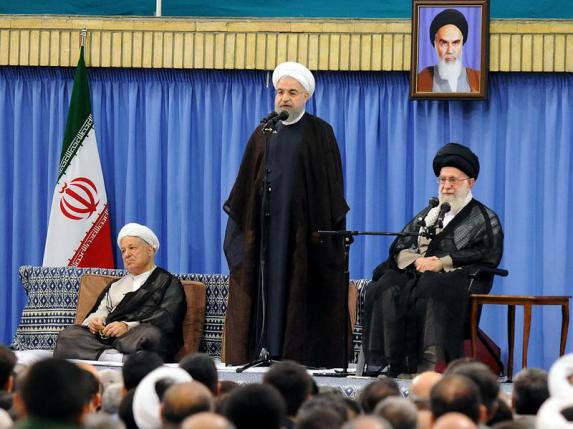July 22, 2016

President Rohani may not run for re-election because hardliners are planning to strip him of effective power if he is re-elected, Reuters reported Monday, quoting an unnamed aide to Rohani.
That is what happened 16 years ago to Mohammad Khatami after he won re-election in a landslide. By the end of his second term, he had become very unpopular because he was very ineffective.
Rohani had substantial authority after he took office in 2013 because Supreme Leader Ali Khamenehi and the hardliners were desperate to win relief from sanctions.
But now that the nuclear deal is done, Reuters says Rohani’s supporters are saying Khamenehi and his followers are trying to restrict the president’s authority—or even replace him. In the face of such pressure, Reuters says, Rohani may not stand in the presidential elections that are 11 months away.
Hardliners have been blaming the president’s faction for the failure of the deal to deliver a swift improvement in living standards, ignoring the fact that sanctions were only lifted six months ago and oil prices are down to 40 percent of what they were before the harsh sanctions were imposed.
A senior official, who asked not to be identified, told Reuters the infighting “will deepen further until the presidential election next year.” And the official said Rohani himself now has “serious doubts about running for a second term.” The concern isn’t that he would lose the election, but that he would be neutered—Khatamied—after the election.
Rohani’s allies believe his personal popularity and the prospect of Iran coming out of its political and economic isolation have panicked hardliners, who fear losing power and aim to bring the presidency to heel.
“Hardliners want a president who is closer to their camp and gets his directions from Khamenehi’s allies,” a reformist former official told Reuters. “If they fail to find a candidate, then they will impose more limits on Rohani in his second term.”
Karim Sadjadpour, a senior associate at the Carnegie Endowment for International Peace, said, “Khamenehi’s ideal set-up is to have weak presidents who can be held accountable for the frustrations and economic malaise that many Iranians feel.”
Khamenehi, he said, does not seek “the support of the electorate, but the support of the protectorate,” referring to the security forces and street thugs who are the ultimate pillars holding up the regime.
“Khamenehi can live without the admiration and social media ‘likes’ of Iran’s urban sophisticates, but not without the loyal support of 150,000 Pasdaran and their Basiji henchmen,” said Sadjadpour.
The parlous state of Iran’s economy pushed the Iranian establishment to accept Rohani as the best option to resolve the nuclear dispute with the West. But Rohani’s allies believe those close to Khamenehi no longer see Rohani as useful.
“Now that the nuclear crisis is over, hardliners want to retake control by weakening Rohani,” said a Rohani ally. “Rohani was elected [only] to resolve Iran’s nuclear issue.”
There is no clear challenger to face Rohani yet, but hardliners hope to reach a consensus on a high-profile candidate for the election in the coming months. That, however, would be a first. In 2013, there were four conservative candidates who split the rightwing vote while Rohani won with 50.7 percent. In 2008, three conservatives fought each other at the polls.
Meir Javedanfar, an Iranian-born lecturer at the Interdisciplinary Center Herzliya in Israel, said, “Rohani’s policy of interaction with the world … scares the hardliners as they believe that, without confrontation, particularly with the West, the Islamic Republic could stop being a revolutionary state.” The hardliners fear that could ultimately “lead to the establish-ment’s collapse.”
Ali Ansari, director of the Institute of Iranian Studies at the University of St. Andrews in Scotland, says, “The focus at the moment is, of course, on the economy and that will be the battleground for the next election.
“The expectations Rohani created around the deal were going to be difficult to reach, and popular disappointment, no doubt encouraged by the hardliners, is likely to rebound on him.”